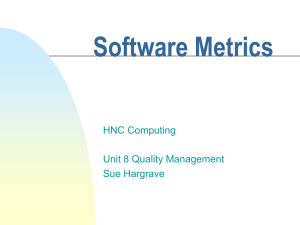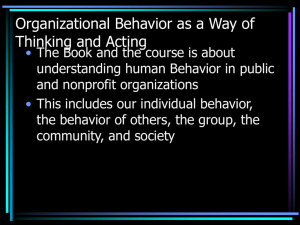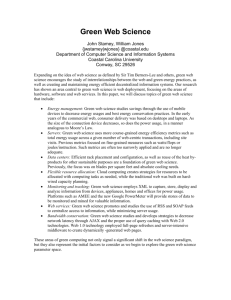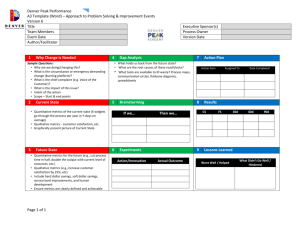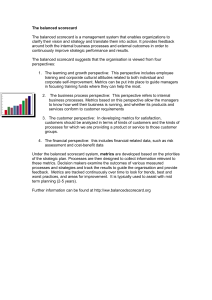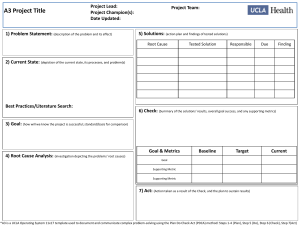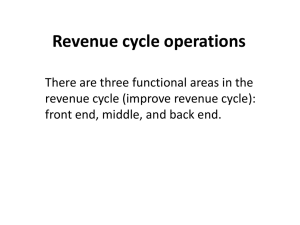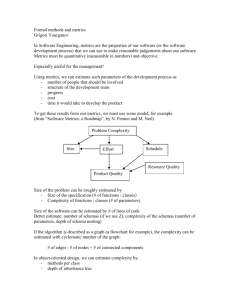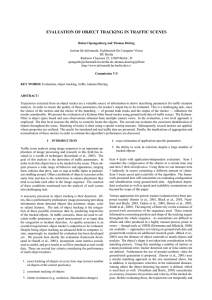Customer Relationship Management - Process Change Presentation
advertisement
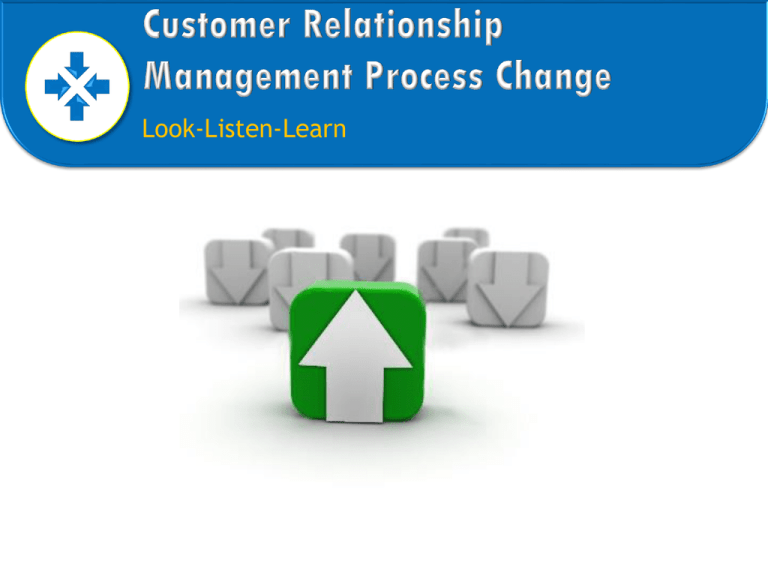
Look-Listen-Learn Executive Sponsors Coaches Team Members Divisions Involved Bill McGrath Christian Madu Matthew Bonilla Information Technology Karen Robilotta Karen Robilotta Joe Constantino Human Resources Ravi Ravishanker Bob Lazer Jason Silverstein Buildings and Grounds Susan Donahue Security Bill Link Transportation Frank McDonald Lenny Craig Tony Negrin Victor Jabar Vincent Beatty Tom Tresselt Fran Crespo Inadequate and inconsistent communication Need for faster/standardized service response times Lack of established service expectation levels Lack of consistent mechanisms for reporting, tracking and assessing progress on service requests Overwhelming desire to utilize technology to automate business processes Goal I (9 Initiatives): Improve communication and service request response time within the Office of Administration to ensure expeditious, informative and professional interactions with all University stakeholders. Goal 2 (4 Initiatives): Utilize technology to streamline business practices focused on creating a more agile customer centric environment. Goal 3 (3 Initiatives): Aggressively utilize service metrics to increase staff accountability and inspire the surpassing of established service goals. Initiative 1: Create and communicate detailed area specific service level standards that establish community expectations for the various services provided by the Office of Administration (based upon community feedback). Initiative 2: Provide brief summary at the beginning of Student/Faculty/Staff Community Meetings listing all Office of Administration accomplishments as well as resolved issues since the previous meeting. Initiative 3: Form an Office of Administration Team with representation from each functional area responsible for attending monthly Student Government Meetings to provide updates on improvements made, record additional issues raised and develop action items (including timelines) for resolving those issues. All information should be posted and tracked in SharePoint. Initiative 4: Implement a monthly facilities meeting program in order to proactively address issues that arise in the residential living spaces (e.g. house/floor meetings). Initiative 5: Establish quarterly meetings with B&G, ITS and Enrollment Management to update the “Money Walk Tour” for potential incoming students and their families to showcase the University’s newest facilities, technologies and services offered. Initiative 6: Have drivers provide a standard greeting to each student as they arrive and leave. Analyze the transportation bus driver schedules and absentee contingency plans to ensure all route services are delivered on time (especially at the St. George street location). Initiative 7: Include professional customer services skills as an essential job requirement for all Office of Administration positions (especially new hires). New hires should be required to respond to behavioral interview questions aimed at assessing customer service knowledge/skills/abilities. Initiative 8: Review the outsourced security vendor contract and work to renegotiate the terms to include guard customer service standards and defined service expectation levels (at no additional cost). Hold the outsourced company accountable to the agreement. In conjunction with HR, become a certified service training provider, allowing in house security staff to save money on required training programs while meeting the University’s customer service training requirements. Initiative 9: Conduct annual Office of Administration service forums in which each division brings a single area specific service issue to the event and utilizes the other departments within Administration to assist in developing improvement strategies for the issues raised. Principles of the President’s Management Culture should be reviewed at these events and utilized in the improvement plan development process. Initiative 1: Reduce costs, increase efficiency and accountability by moving all Office of Administration departments onto a single helpdesk ticketing system providing stakeholders with an interface that has the same look and feel while allowing for service requests to be easily transferred between areas, tracked and reported on. Develop plan for turning the University Switch Board Operators into a 311 service. Initiative 2: Implement an in-house B&G electronic inventory tracking system enabling central purchasing of supplies while allowing each campus to have small amounts of secured on hand inventory to provide more efficient repair services. Initiative 3: Create an in house application that will allow students to view Pace bus schedules on their mobile devices along with utilizing GPS to determine real time bus locations. Initiative 4: Completely automate guest user account creation request process/procedure to ensure streamlined bulk account creation and individual account creation within 24 hours (for standard requests). Implement guest provisioned (defined time wireless internet access) for immediate access. Initiative 1: Implement Office of Administration secret shopper program which results are tracked, shared with Senior Leadership and communicated to respective divisions. Staff members should be formally recognized for outstanding service and corrective action plans developed in situations where below standard service was documented. Initiative 2: Consolidate Office of Administration stakeholder surveys into one concise bi-annual process and develop published action items by division to address issues identified. Initiative 3: Establish three high level service metrics in each Office of Administration Division which are tracked and utilized to develop improvement strategies. Metrics will be approved by the Senior VP of Administration. Divisions surpassing their target goals will be rewarded as a team. Metrics will be tracked on a standard scale applicable to all Office of Administration areas.
